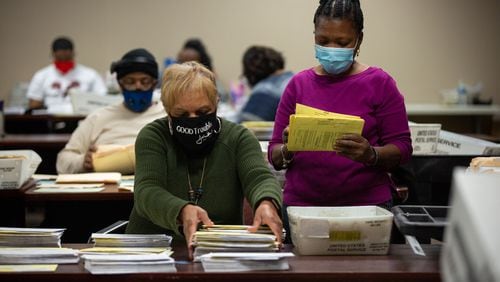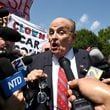If this were only about physical tools, there wouldn’t be a question whether Jalen Collins will make the Falcons look good for drafting him. He is tall and fast and plays cornerback, a combination that gives coaches the same look that miners had when they found something sparkly and gold mixed into rocks and dirt.
But success in the NFL doesn’t hinge merely on size and speed. Teams get suckered in by the measurables all the time. That’s why geraniums like Ryan Leaf get drafted second overall and Tom Brady waits until pick No. 199 (Pinocchio tendencies, notwithstanding). NFL success hinges on things that can’t be measured with a stopwatch — maturity, intelligence, work ethic — which is why there’s some debate about Collins.
“I personally don’t think I’m a risk,” the Falcons’ second-round pick said after a light workout at a Falcons rookie camp. “I know myself. I’ve gotten myself under control. I’m living right.”
Exhale.
Exhale?
Collins was elevated to starter his junior season at LSU when Rashard Robinson was kicked off the team. There was some symmetry there. Collins played regularly as a freshman and started the first two games as a sophomore, but then lost his job to Robinson.
“I was benched,” he said. “After that I was pretty much on special teams the rest of the season. I didn’t think I was terrible. I could have done some things better, but I didn’t really agree with the decision.”
He was angry. He sulked. He blamed the world. He considered transferring. He admits he started “hanging around some of the wrong people” and doing some of the wrong things. Too often, he looked for an escape with mind-altering substances.
News leaked before the draft that Collins failed three drug tests at LSU. The time-frame is non-specific, but Collins said his problems primarily came in his sophomore season in 2013.
“When I was down, it was hard to deal with,” he said. “I wanted to just be done with it all. Now it (marijuana) is just an escape that people use.”
A number of teams were interested in Collins. He had 26 interviews at the scouting combine, with the Falcons, New Orleans, Green Bay and Pittsburgh reportedly among the serious parties.
That speaks to his talent level and, to some degree, perhaps how far he has come. Nebraska defensive end Randy Gregory and Missouri outside linebacker Shane Ray both slid significantly in the draft, in part because of drug issues. Collins was projected as a late first or early second-round pick, which is where he went.
“He got a bad rap,” said Corey Raymond, LSU’s secondary coach and a former NFL defensive back. “The stuff you’re hearing about is more from early in his career. His mom played a big role in helping him. He came back the next year, and he was like a new person.”
Collins affirmed that family members supported him and jolted him back to reality. They were “just trying to keep me calm,” he said.
“When you lose your starting job, you just want to be mad and upset all the time. I just wanted to blame everybody else. They got me to realize I can only control what I can control. My mom got me to realize what I had at stake, and if I kept going down that path I probably wouldn’t be here right now. I had to check my friends and the decisions I was making.”
What did he learn?
“Control what I can control. I realized it was my actions that got me to where I was at.”
Falcons coach Dan Quinn came from the Seattle Seahawks, who are known for taking risks on some players.
“You do it on an individual basis,” he said. “If a player has a setback, how are they coming back from that? You’re always cautious with a player who has had things repeat over and over again. But when those setbacks happen and then you’re on the right course, you’re more comfortable.”
The Falcons also are comfortable where Collins is physically. He had the beginning of a “Jones fracture” in his right foot, requiring surgery in March. A screw was inserted to stabilize the area. Consequently, he did not run drills in a rookie minicamp this week, but will be ready for training camp in July, Quinn said.
Collins is Quinn’s kind of player: Fast, physical tough. Just look at Seattle’s defense. He could push Robert Alford for a starting job, with one or the other moving inside in nickel situations.
“I’ll do whatever they want,” Collins said.
Humility is a wonderful thing.
Collins expected his failed drug tests to come up in pre-draft interviews.
“Every team asked me that question,” he said. “They just said: ‘Make sure you stay clean because we’ll definitely use you.’”
It could be that simple.





